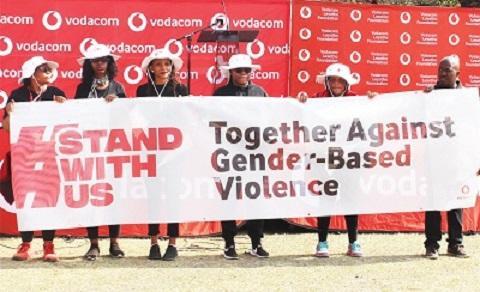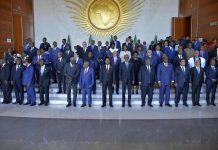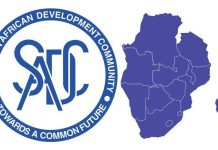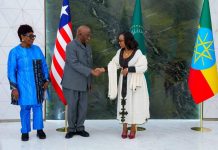Africa-Press – Lesotho. Vodacom Lesotho through the women network forum engaged in a gender based awareness march as to take part in the ending of gender based violence, at Vodacom Park on Monday the 11th September in commemoration of the late Rethabile Mofolo and other victims of GBV across the globe.
Gender-based violence (GBV) can happen to anyone. However, it disproportionately affects women and girls. Those in crisis settings are at a double disadvantage due to their gender and situation.
The Vodacom Lesotho external affairs manager Mr. Katleho Pefole stated that Lesotho is one country with the highest cases of gender based violence across the world.
“GBV is not something we support as a country, we out right reject it as a cancer that we want to uproot”, vocalized Pefole.
Women and girls from other diverse and marginalized communities face an even greater risk where gender inequality intersects with other forms of oppression.
GBV is an umbrella term for any harmful act perpetrated against a person’s will, and is based on socially ascribed gender differences between females and males.
The term encompasses acts that inflict physical, sexual or mental harm or suffering; threats of such intimidations, force, and other deprivations of liberty.
These acts can occur in public or private. They encamps: domestic violence, rape, trafficking, early and forced marriage, sexual harassment, sexual exploitation and abuse.
Above are the most common types of GBV in humanitarian emergencies. GBV is deeply rooted in gender inequality and discriminatory gender roles and norms. During humanitarian emergencies, gender dynamics may be affected, and inequalities worsened, further fuelling risks of GBV for women and girls.
This is especially when family and community’s protection have been broken down, exposing women and girls to attacks as they perform gender roles, such as fetching water, food and firewood.
They may also be targeted by armed actors who use sexual violence as a tactic of war, control and exploitation. Addressing all forms of GBV is a priority in humanitarian settings because such acts pose immediate and life-threatening health consequences.
Women and girls with disabilities are even more at risk. It is therefore important that humanitarian actors ensure that their actions and initiatives prevent and mitigate GBV. The chief executive officer of VCL Mr.
Mohale Ralebitso stated that the 11th September marks the life of a woman’s life lost in the hands of an abusive man, he went on further to explain that Rethabile Mofolo lost her life to an abusive man who was meant to love and not harm her.
“We have created the Nokaneng application which will assist women to report, and engage in conversations which will help build each other.
We also have Lapeng care center which support victims of GBV, so I am hopeful that today’s walk is a marker and reminder that we have unfinished business in this country to render a healthy nation of ourselves, an exemplary nation where women and children can be safe”, Ralebitso professed.
On behalf of the LMPS Deputy Commissioner Dr. Mahlape Morai, urged the entire nation to report abuse as it occurs because it is also a serious crime. “If you guys fail to report these cases, how are we, as police officers supposed to know that they are happening? You as a nation are the first ones who can help fight against GBV”, Emphasized Dr.
Morai. She concluded by advising all to stop turning a blind eye to GBV. The United Nations resident coordinator Mrs. Amanda Khozi Mukwashi believes that GBV has become an affliction name or just a phrase, which means that people have normalized violence within their communities and societies.
“A believed reality in many countries across the world is that women remain treated as second class citizens, sadly Lesotho is no exception.
Lesotho has normalized violence against women and it stands at top 5 globally in terms of the number of women who are abused. According to studies, about 86% of women in Lesotho are abused.
But what is GBV? Breaking it down I would say it is talking about a girl in Maseru going to school, minding her own business and then out of nowhere gets raped and killed, that is the reality of GBV.
And so, the sketch of GBV has become a norm to such a point where a human can get beaten in her house by the husband, cry out and the neighbors hear but turn a deaf ear because the society believes the husband has the right to discipline her”, Mrs.
Amanda stated. Adding to that she wonders why the country is not developing communities with stability. “I believe such a time until women are respected, their personhood and their dignity respected, and are considered as equal partners in the economic and social development of our country, Lesotho will not be at peace, stable and progress.
I hope that as you were walking, you took time to reflect as to why you were walking, let me end by saying this; Rethabile is the name that we remember but I can guarantee you that there are thousands of names we do not know, the faces that are nameless! As the UN we have taken GBV as a challenge we must address, and we invite you all to join us as you have joint VCL and come together as a society to fight GBV.
I believe that every single one of us can help fight GBV, and I promise that every single speech I make while still here in Lesotho will be to fight and end GBV until every Rethabile is remembered and there are no more cases of GBV”, Amanda concluded.
Tsepiso Mofolo, the brother to the late Rethabile Mofolo expressed his appreciation to what VCL and the LMPS are doing in commemoration of his late sister, “I offer my gratitude to the LMPS for their hard work, dedication and service, for responding quickly to emergencies and upholding law and order.
They did it all with immense bravery and courage, and the court is already working on solving the case”, said Mofolo. In his closing remarks, the Minister of Gender, Youth, Sports, Arts, Culture and Social Development Hon. Lesaoana Pitso commended the march saying that it is going to maintain women’s dignity, significance and freedom.
“It is true that such acts of raising awareness about this brutal acts will send a strong message that can help bring sways in the GBV, with this march we set out to maintain the highest standards of human dignity to ensure that no one suffers any aggression”, assured Hon.
Lesaoana. Adding that Lesotho’s culture is still one of the main triggers of GBV; women not working, women expected to sit in a particular way or dress in a certain way, not expressing themselves vocally because it is considered disrespectful.
“I wish we all take our time to reflect on the violence structures embedded on our culture, then we would understand how extreme our culture is contributing to GBV”, said Hon Lesaoana.
He then concluded by calling on everyone to embark on a journey towards full gender reconciliation, “It is my hope that we shall reach a destination powered by unity, peace, love and harmony between all genders”.
For More News And Analysis About Lesotho Follow Africa-Press






